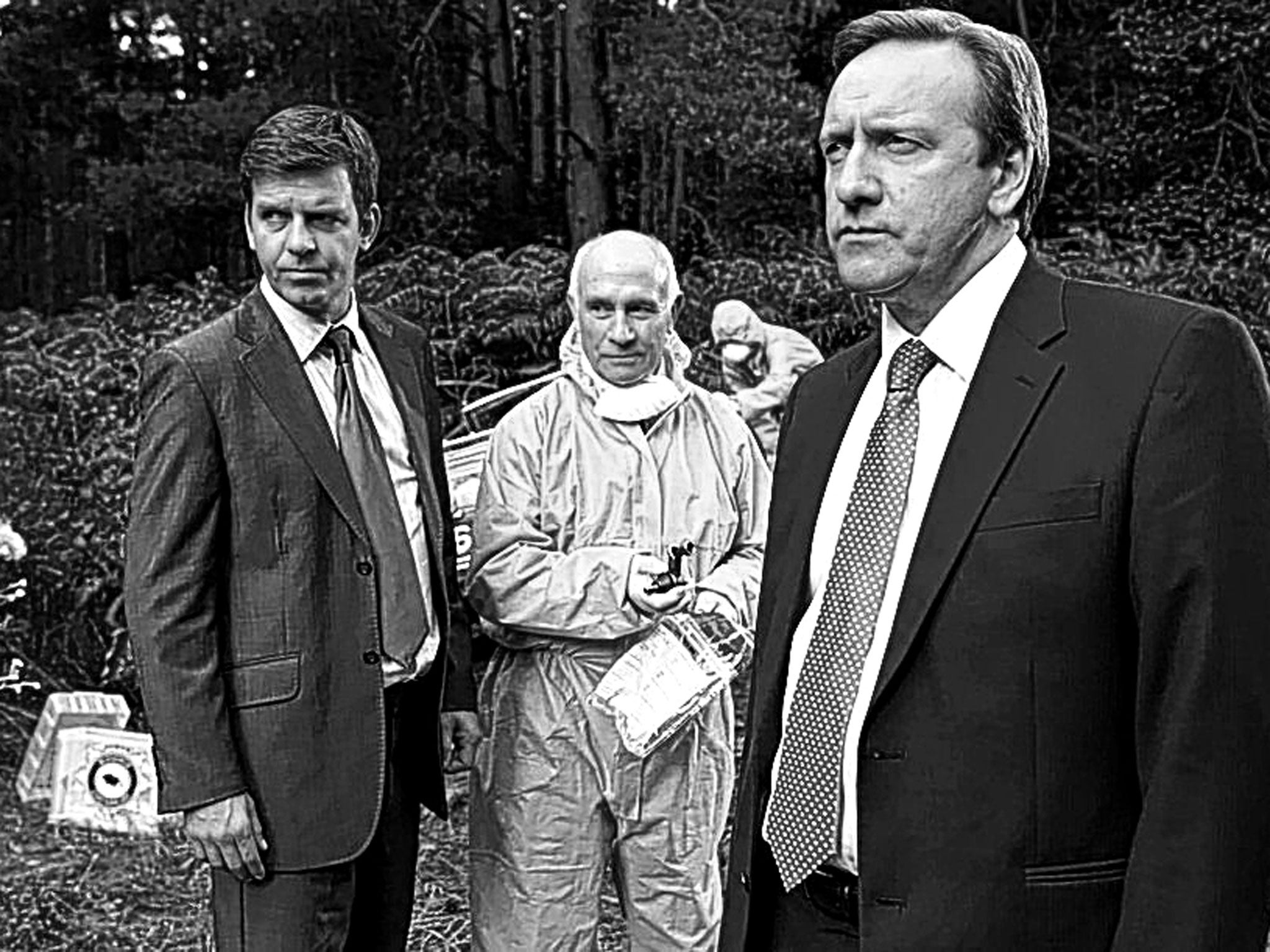Barry Jackson: 'Midsomer Murders' pathologist who also played a rent collector in the seminal drama 'Cathy Come Home'

The actor Barry Jackson became a household face, if not name, as the forensic pathologist Dr George Bullard in Midsomer Murders for 13 of its first 14 series, beginning in 1997, after almost four decades of playing character roles on television. He was unmistakeable in his sky-blue pathologist's protective clothing – which he referred to as his "Babygro" or "boiler suit" – giving the gruesome lowdown on corpses to Detective Chief Inspector Tom Barnaby (John Nettles) in the detective drama set in a part of rural England seemingly plagued by a high murder rate. (Scenes in the fictional county town of Causton are filmed in Wallingford, Oxfordshire.)
Jackson was in no doubt about his "favourite" murder victim. "Oliver Ford Davies pinned to his lawn by croquet hoops and eventually done to death by a succession of his best wine bottles being aimed at him, courtesy of a Roman catapult," he said. During his long run in the programme, the actor missed only one series, because his commitment to a stage tour clashed with the schedule. When Nettles announced he was leaving, to be replaced as the star in 2011 by Neil Dudgeon, playing the original detective's cousin, DCI John Barnaby, Jackson told the producer he would follow if his character were not given a bigger role.
He was written out after four episodes alongside Dudgeon and replaced by Tamzin Malleson as the pathologist. Reflecting on some of the racier new storylines, Jackson said: "I do worry this new licence to spice things up might alienate the heartland audience."
His Midsomer Murders role was in contrast to many he took during his early days in television, when he was cast as menacing characters, sometimes on the other side of the law. In the classic play Cathy Come Home (1966), Jeremy Sandford's shocking tale about the homeless, directed with unnerving realism by Ken Loach, Jackson was seen as the dispassionate Birmingham rent collector demanding arrears from the young married couple played by Carol White and Ray Brooks.
This gave him his first experience of a director asking him to go beyond the script and improvise after banging on the door, as the distinction between fiction and reality was being blurred by a pioneering director challenging the old values of the medium.
"I was trained at Lamda, where we were encouraged to improvise," Jackson told me in 2002. "It was unusual in television, but I had been forewarned that Ken worked like that. It ended up, rather distressingly, with Carol White shutting the door on me." The court case that followed the scene led to the couple's eviction, beginning the downward spiral that shocked a nation and speeded up the formation of the homeless charity Shelter.
Birmingham was the city of Jackson's birth. His mother and father, an engineer who worked as a metal pattern maker for the British Motor Corporation in Longbridge, named him after the founder of Birmingham's celebrated repertory theatre company. By the age of nine he was acting on radio in Children's Hour at the BBC's Birmingham studios and, seven years later, worked in his spare time as a stagehand at Birmingham Repertory Theatre.
On leaving King Edward VI Five Ways Grammar School in 1954, Jackson moved to London to train at Lamda. After repertory theatre experience, he made his television début in An Age of Kings (1960), a 15-part anthology of Shakespeare's history plays. First he played Michael in Henry VI, Part 3, then the Earl of Surrey in Richard III, Part 2.
For the rest of his life he remained in demand for character roles on television, usually one-offs in series such as A Family at War (1971), Moll Flanders (1975), Blakes 7 (1978), All Creatures Great and Small (1980), Minder (two parts, 1984, 1994), Kavanagh (1998) and Heartbeat (three parts, 1994, 2004, 2006).
A rare starring role brought Jackson particular satisfaction, as the title character in Horace (1972), a Roy Minton-written, Alan Clarke-directed BBC play about a man with learning difficulties who works in a joke shop. Ten years later, it was revived as a series by ITV.
He also played Grandad (1997-2001) in the children's series Bernard's Watch and took three roles in Doctor Who – the mute assassin Ascaris trying to kill the Doctor (1965), Jeff Garvey, on an expedition to the planet Kembel (1965), and renegade Time Lord Drax (1979).
Among almost 20 film appearances, Jackson had roles in Ryan's Daughter (1970), Barry Lyndon (1975) – both as soldiers – and Wimbledon (2004). He played the lead, a mild-mannered gardener with a horde of female admirers, in the comedy Mr Love (1985).
During the 1960s, when he became an aikido black belt, he worked as a stunt performer and arranger under the name Jack Barry. On television, he was fight arranger for some 1966 episodes of the fantasy series Adam Adamant Lives!, starring Gerald Harper as a suave Edwardian crime-buster.
Jackson, who also taught t'ai chi, had taken up natural beekeeping on his London allotment in recent years. He died of cancer.
Barry Jackson, actor, stuntman and fight arranger: born Birmingham 29 March 1938; married firstly Sally Adams (divorced; two daughters), secondly Alison Todd (divorced; one son, two daughters), thirdly Denise Blake (one son); died London 5 December 2013.
Subscribe to Independent Premium to bookmark this article
Want to bookmark your favourite articles and stories to read or reference later? Start your Independent Premium subscription today.

Join our commenting forum
Join thought-provoking conversations, follow other Independent readers and see their replies